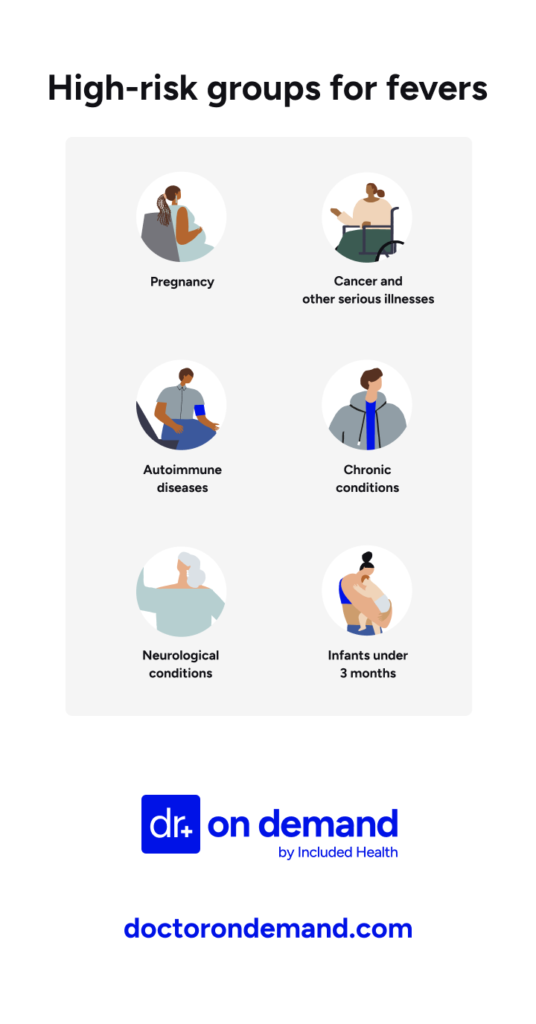Table of contentIn this article
- When to go to Urgent Care for Fever: How Urgent Care Helps
- When to go to the urgent care for a fever
- When to go to urgent care for fever by age group
- What urgent care can do for your fever
- High-risk groups for fevers
- Symptoms that make a fever more serious
- How can I treat a fever at home before going to urgent care?
- How Doctor On Demand helps you manage a fever
- Doctor-answered FAQs about high fevers
When to go to Urgent Care for Fever: How Urgent Care Helps
You can manage mild fevers at home, but some fevers can cause concern and require urgent care. Learn how to decide the best course of action, including when to seek urgent care for a fever and what symptoms to look for by age and risk categories.
When to go to the urgent care for a fever
You should visit urgent care if your fever climbs to 103°F or higher and lasts over 48 hours or doesn’t drop with over-the-counter medication. Adults with a fever of 100.4°F for over five days should also get a check-up.
A fever often means your body is doing its job, actively fighting a viral or bacterial infection. A 2023 research study, “Fever in the Intensive Care Patient,” suggests that fever is expected to protect and help the host purge the invading organisms. However, other symptoms, such as dizziness or severe headaches, can signal something more serious. Knowing when to get help is particularly important when caring for young children, older adults, or someone with underlying conditions.
When to go to the ER instead for a fever
Head to the ER if your fever reaches 105°F or higher or if you have severe additional symptoms or chronic conditions. These symptoms include difficulty breathing, confusion, chest pain, and a stiff neck. Patients with chronic conditions or compromised immunity should also seek emergency treatment if a fever persists or worsens.
Here’s a closer look at those symptoms and more that indicate it’s time to head to the emergency room:
- Chest pain: Tightness in the chest may signal heart issues or pneumonia.
- Trouble breathing: Difficulty taking a deep breath or wheezing requires a prompt evaluation.
- Stiff neck or neck pain: Turning your neck to the right or left or looking downward should not be painful or difficult. If it is and you have a fever, head to the ER for evaluation.
- Confusion: A fever accompanied by confusion can suggest a neurological condition that needs further evaluation. Also, elderly patients with pain or burning during urination from a UTI and fever may experience confusion and dementia-like symptoms.
- Slurred speech: Speech difficulty can indicate a serious neurological problem requiring emergency care.
- Extreme fatigue: Feeling excessively tired while fighting sickness may mean your body needs extra support, especially if you have trouble waking up or keeping up with your basic needs.
- Seizure: Febrile seizures occasionally occur in young children when their temperature rises too quickly. Immediate medical attention is vital for seizures or convulsions.
- Severe headache: A headache, especially one that is debilitating and does not subside with home remedies, requires prompt emergency attention. An ER can provide IV medications, such as magnesium, NSAIDs, hydration, and anti-nausea medication to relieve headache discomfort.
Any of these symptoms or a combination could indicate a medical emergency requiring urgent professional care. Call 911 if you are unable to get there safely.
When you can use telehealth for a fever
Telehealth is a quick and convenient way to receive medical advice and treatment. If you have a fever between 100.4°F and 102°F with mild symptoms, such as chills, sweating, general fatigue, or body aches, telehealth is a good first line of defense.
It’s not uncommon to get a fever with a common cold or RSV, and as long as you are not in a high-risk category, telehealth is a safe option. Many telehealth options are available, starting with your primary doctor or a service such as Doctor On Demand. Most only require a mobile phone, tablet, or computer.
When to call 911 for a fever
If needed, 911 will dispatch an ambulance. It will offer immediate treatment, including IV bags, cooling methods, epinephrine, and other medical supplies to help manage severe fever-related emergencies.
Call 911 if your fever is accompanied by a seizure, loss of consciousness, slurred speech, difficulty breathing, or if you’re unable to drive yourself to the ER safely. These symptoms may signal a critical issue that needs emergency attention.
When to go to urgent care for fever by age group
A person’s age group helps determine when to seek urgent care for a fever. For example, infants, toddlers, and older adults should get urgent care for a fever over 100.4°F. The threshold rises for other age groups.
Below is a quick-reference table by age group, outlining when to visit urgent care.
Fever thresholds by age group for urgent care
| Age | Fever threshold for urgent care | Additional symptoms | Notes |
| Infants (0-3 months) | >100.4°F | NOTE: Any fever in a newborn warrants evaluation. It’s best to take infant temperatures rectally. | Any fever in a newborn warrants evaluation. It’s best to take infant temperatures rectally. |
| Infants and toddlers (3-36 months) | >100.4°F | Fever lasting more than 2-3 days • Any wheezing• Fewer wet diapers• Vomiting or diarrheaDecreased oral intakeEar pain | Urgent care can check these infants and toddlers if your PCP is not available. |
| Children (3-12 years) | >103°F | • Widespread rash | Seek urgent care for any fever with rapid worsening or severe symptoms or fevers that last over 48 hours and are not improved by home treatment. |
| Adolescents and adults (13-64) | >103°F | • Severe headache• Stiff neck• Confusion• Trouble breathing• Extreme fatigue• Persistent vomiting or diarrhea | Urgent care is recommended for fevers lasting more than 48 hours and not improving with over-the-counter medications. Seek immediate care if you have risk factors, such as chronic illness. |
What urgent care can do for your fever
Urgent care staff will take your temperature and may test for infections such as strep throat, flu, or urinary tract infection (UTI). If you have a bacterial infection, they may prescribe antibiotics. They may offer fever reducers such as ibuprofen (Advil) or acetaminophen (Tylenol). They’ll also advise on follow-up.
Your urgent care visit for fever may include:
- A brief physical exam: The urgent care provider will check your temperature, blood pressure, pulse, and oxygen levels, and listen to your heart and breathing to assess for flu, respiratory infections, and other illnesses.
- Guidance on rest and nutrition: Rest, proper nutrition, and hydration are essential for recovery. Urgent care may advise you to stay home from work, eat a specific high-nutrition diet, and drink lots of water and decaffeinated beverages.
- Blood work and testing: If a treatable condition is suspected, urgent care staff may perform blood work, imaging, or other diagnostic testing. These may include a complete blood count (CBC), chest X-ray, urinalysis, or rapid strep test.
- Follow-up instructions: They will advise you on the next steps before leaving urgent care. This may include further laboratory tests, follow-up with your primary doctor, taking over-the-counter cold and flu medicines, or being transported to the ER if your condition is an emergency.
High-risk groups for fevers
Patients with other health problems are more likely to have complications with a fever. If you are immunocompromised at any age, even a low fever or mild symptoms can be serious. A moderate fever that persists or worsens means it’s time to visit urgent care.
Here’s an overview of factors that may place you in a high-risk group for fevers:
- Chronic conditions (heart disease, diabetes): These conditions raise the urgency threshold for a fever, so it is important to closely monitor your temperature and seek urgent care sooner.
- Pregnancy: A fever may affect you and your unborn baby, so you should get prompt medical attention.
- Neurological conditions (Alzheimer’s, Parkinson’s): People with neurological conditions might struggle to notice fever symptoms. This can delay care and lead to poor outcomes.
- Cancer and other serious illnesses: Patients undergoing treatment like chemotherapy can have a weak immune system. This makes it harder for them to fight infections. A 2017 article in The American Journal of Emergency Medicine, titled “Evaluation of fever in the emergency department,” found that fever may not always be present in true infection, especially in older adults and immunocompromised patients. Low fevers are a warning sign to seek immediate medical help.
- Autoimmune diseases (rheumatoid arthritis, lupus): These diseases and their treatment medications may reduce immune defense. Mild fevers can be more significant threats for these patients.
- Infants: A baby under three months old with a fever should receive prompt medical attention.

Symptoms that make a fever more serious
Serious fever symptoms include a stiff neck, seizures, confusion, extreme fatigue, severe headache, chest pain, rash, abdominal pain, persistent vomiting or diarrhea, and fainting. If any of these occur, seek urgent care, go to an ER or call 911 immediately.
These symptoms can help pinpoint the root cause and whether you need urgent care. Here’s a closer look at the symptoms and others that make a fever more serious:
- Stiff neck or neck pain: Difficulty or pain when moving your neck side to side or looking down, when you also have a fever, could indicate a more serious condition, like meningitis.
- Convulsions or seizures: Febrile seizures or uncontrollable shaking can be concerning and should be medically assessed.
- Extreme fatigue: A medical professional should evaluate weakness, delirium, the inability to wake, or difficulty meeting your basic needs.
- Confusion: Sudden abnormal behavior, confusion, or altered speech in someone without dementia may indicate something more serious, such as a UTI, especially in elderly patients.“Elderly patients with a UTI may not experience typical symptoms such as pain with urination or urinary frequency, and there may be only a low-grade fever or no fever at all. It’s important to monitor for any mental status changes in elderly patients, which might indicate an underlying infection. Seeking prompt medical attention is crucial to determining the cause of the symptoms and start treatment,” says Dr. Ashley Kelley.
- Severe headache: If your headache is severe and relief is not coming from home remedies, you may need further care to diagnose the underlying cause and relieve discomfort.
- Chest pain or pressure: Fever accompanied by chest pain or pressure could indicate serious conditions like pneumonia or heart problems and require immediate attention.
- Wheezing or difficulty breathing: Difficulty breathing or noisy breathing may signal pneumonia or bronchitis. Depending on the cause, these symptoms may require medications such as corticosteroids, antibiotics, or antiviral treatments (Tamiflu).
- Rash: A fever with a rash could indicate roseola, which is common in children, scarlet fever, strep throat, or other serious infections needing evaluation.
- Persistent vomiting or diarrhea: Gastrointestinal symptoms accompanying a fever may indicate a viral illness or food poisoning. If symptoms are continuous or worsening, seek medical attention to determine the underlying cause and ease discomfort with antiemetics (anti-nausea medications). Dehydration can quickly worsen your condition and may require IV hydration to help your body get healthy.
- Heart problem: Any heart-related symptoms, such as rapid heartbeat or palpitations, should be evaluated to rule out severe conditions.
- Fainting: Losing consciousness can be scary and dangerous. This requires immediate medical attention to determine the underlying cause.
- Blue lips or fingernails: Blue discoloration indicates that your body lacks oxygen, which is life-threatening. Head to the ER immediately.
- Trouble urinating or blood in your urine or stool: Blood in your urine may indicate a UTI, while tar-colored stools may suggest internal gastrointestinal bleeding. Both require quick medical evaluation to prevent dangerous hemoglobin loss.
- Earache: Unresolved ear pain with a fever could indicate an ear infection or sinusitis. If the infection is bacterial, antibiotics can help.
- Sensitivity to light: Fever with light sensitivity might signal a condition needing immediate medical attention.
- Productive cough with discolored mucus: A persistent cough that produces discolored mucus that is yellow, green, blood-tinged, or any other unusual color mucus accompanied by a fever may indicate bacterial pneumonia or bronchitis. Both require evaluation and potential antibiotics. Note that discolored mucus on its own may not indicate an infection.
If you have any of the above serious symptoms and cannot see your doctor or get to urgent care immediately, it is best to visit the ER or call 911.
Red-flag symptoms that can accompany fever
How can I treat a fever at home before going to urgent care?
Rest, hydration, and over-the-counter fever reducers like acetaminophen or ibuprofen can help lower a fever at home. Wear lightweight clothes and drink plenty of fluids to prevent dehydration. If symptoms last longer than 48 hours or worsen, seek medical advice or urgent care.
Here are more tips on how to treat a fever at home before going to urgent care:
“When advising my patients about treating fever at home, I remind them that the goal is to improve comfort rather than to normalize body temperature. Fever is a natural response to infection and can help the body fight off illness,” says Dr. Ashley Kelley. “In addition to over-the-counter fever reducers such as acetaminophen and ibuprofen, patients can help themselves or their children feel better by focusing on hydration with water, clear soups and oral rehydration solutions, and wearing light, comfortable clothing to avoid trapping in heat. I recommend patients monitor their fever at home, and seek immediate medical if there are signs of serious illness, such as difficulty breathing or vomiting or the fever persists for more than 3 days. Infants younger than 3 months old should be evaluated immediately.
How Doctor On Demand helps you manage a fever
A virtual visit with Doctor On Demand using your phone, tablet, or computer is an easy and convenient care option. Providing accurate health details helps your doctor, nurse, or clinician treat you appropriately. Prepare by listing your symptoms, medications, and any questions you want to ask.
How to prepare for a Doctor On Demand visit for your fever:
- Have a device available: Charge your mobile device, tablet, or computer, and confirm a stable internet connection.
- Know your symptoms: Write them down, including when and how they have progressed.
- Have your thermometer: Your doctor may ask for your highest and current temperatures.
- Gather all medications: List your current medications, both over-the-counter and prescription, including dosage.
- Have medical history available: Your virtual doctor will want to know if you have any chronic health conditions and symptoms that may or may not be related to your fever.
- Get your questions ready: Note all the questions you’d like to ask so you don’t forget them.
Doctor-answered FAQs about high fevers
Here are frequently asked questions regarding high fevers.
- When is a fever an emergency?
Call 911 if your fever comes with seizures, unconsciousness, slurred speech, or trouble breathing, or if you cannot reach the hospital safely. If it’s 105°F or higher, or you have confusion, chest pain, or a severe headache, go to the ER. Chronic conditions, pregnancy, immune deficiencies, or infants with a high fever require earlier care.
- Can you have a cold without a fever?
Yes. Many common colds and RSV appear with just a stuffy nose, sore throat, or cough without raising your temperature. Many symptoms can be minimized with over-the-counter cold and flu medication.
- What do doctors do about high fevers?
Doctors will take your vital signs, including pulse, blood pressure, and temperature, and ask about your symptoms. They may order further testing to check for infections. If you have a bacterial infection, they may prescribe antibiotics. They may also advise on home treatment.
- How long is too long to have a high temperature?
If your fever lasts longer than 48 hours, is accompanied by severe symptoms, or won’t react to over-the-counter treatments, it’s time to seek medical care. Seek medical care for any fever if you have other health issues or are pregnant or elderly. Infants are also of special concern.
- What are the risks associated with high fevers?
High fevers can lead to dehydration, confusion or delirium, seizures, or worse outcomes if left untreated. This is especially serious for the elderly, pregnant, young children, or those with comorbidities.
- How do you help someone with a high fever?
Encourage them to rest, drink fluids to prevent dehydration, and use over-the-counter medications following dosage recommendations. You can help monitor their symptoms and seek urgent or emergency care if their fever persists or severe symptoms appear.
- What do hospitals do for high fevers?
If you visit the hospital for a fever, medical staff will take your vitals, ask about symptoms, and evaluate your condition. They will typically administer IV fluids to prevent dehydration, conduct further imaging or labs, and provide medications. They will monitor you for complications.
- What should I do if I am diabetic with a high fever?
Diabetes can make it more difficult to fight infection while managing blood sugar levels. If you have sick day guidance from your doctor, follow it. Monitor your blood sugar more often, stay hydrated, and contact your doctor or go to urgent care.
- Does having COPD change how I should handle a fever?
COPD or any other breathing condition requires careful attention. Monitor your breathing, follow any care plan from your doctor, and seek urgent care if your fever is above 103°F or you have difficulty managing symptoms.
- Why is my fever not going away?
A lingering fever often indicates an underlying infection or undiagnosed condition that requires specific treatment. Inadequate rest and hydration can also prolong recovery. If your fever is not improving and lasts more than a few days, seek medical care.
About the authors

Dr. Jeanette Carpenter is board certified in Family Medicine and practices in Virginia. She has an interest in preventative medicine and holistic medicine and has a certification in plant based nutrition from eCornell. She believes stress and lifestyle impacts the disease process and spends extra time educating patients on lifestyle modifications that can improve their overall health.

Quan Lam is a copywriter with over 15 years of experience writing and editing content for both start-ups and legacy brands, as well as 2 years of writing experience exclusively within the healthcare space. She currently lives and works in New York City.



